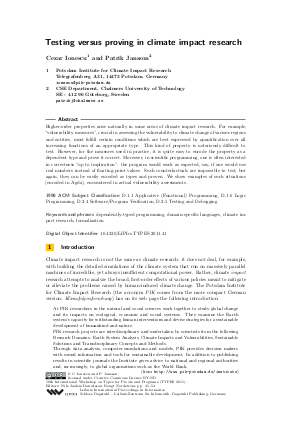Testing versus proving in climate impact research
Authors Cezar Ionescu, Patrik Jansson
-
Part of:
Volume:
18th International Workshop on Types for Proofs and Programs (TYPES 2011)
Part of: Series: Leibniz International Proceedings in Informatics (LIPIcs)
Part of: Conference: International Conference on Types for Proofs and Programs (TYPES) - License:
 Creative Commons Attribution-NoDerivs 3.0 Unported license
Creative Commons Attribution-NoDerivs 3.0 Unported license
- Publication Date: 2013-01-21
File

PDF
LIPIcs.TYPES.2011.41.pdf
- Filesize: 439 kB
- 14 pages
Document Identifiers
Subject Classification
Keywords
- dependently-typed programming
- domain-specific languages
- climate impact research
- formalization
Metrics
- Access Statistics
-
Total Accesses (updated on a weekly basis)
0PDF Downloads0Metadata Views
Abstract
Higher-order properties arise naturally in some areas of climate impact research. For example, "vulnerability measures", crucial in assessing the vulnerability to climate change of various regions and entities, must fulfill certain conditions which are best expressed by quantification over all increasing functions of an appropriate type. This kind of property is notoriously difficult to test. However, for the measures used in practice, it is quite easy to encode the property as a dependent type and prove it correct. Moreover, in scientific programming, one is often interested in correctness "up to implication": the program would work as expected, say, if one would use real numbers instead of floating-point values. Such counterfactuals are impossible to test, but again, they can be easily encoded as types and proven. We show examples of such situations (encoded in Agda), encountered in actual vulnerability assessments.
Cite As Get BibTex
Cezar Ionescu and Patrik Jansson. Testing versus proving in climate impact research. In 18th International Workshop on Types for Proofs and Programs (TYPES 2011). Leibniz International Proceedings in Informatics (LIPIcs), Volume 19, pp. 41-54, Schloss Dagstuhl – Leibniz-Zentrum für Informatik (2013)
https://doi.org/10.4230/LIPIcs.TYPES.2011.41
BibTex
@InProceedings{ionescu_et_al:LIPIcs.TYPES.2011.41,
author = {Ionescu, Cezar and Jansson, Patrik},
title = {{Testing versus proving in climate impact research}},
booktitle = {18th International Workshop on Types for Proofs and Programs (TYPES 2011)},
pages = {41--54},
series = {Leibniz International Proceedings in Informatics (LIPIcs)},
ISBN = {978-3-939897-49-1},
ISSN = {1868-8969},
year = {2013},
volume = {19},
editor = {Danielsson, Nils Anders and Nordstr\"{o}m, Bengt},
publisher = {Schloss Dagstuhl -- Leibniz-Zentrum f{\"u}r Informatik},
address = {Dagstuhl, Germany},
URL = {https://drops.dagstuhl.de/entities/document/10.4230/LIPIcs.TYPES.2011.41},
URN = {urn:nbn:de:0030-drops-38991},
doi = {10.4230/LIPIcs.TYPES.2011.41},
annote = {Keywords: dependently-typed programming, domain-specific languages, climate impact research, formalization}
}
